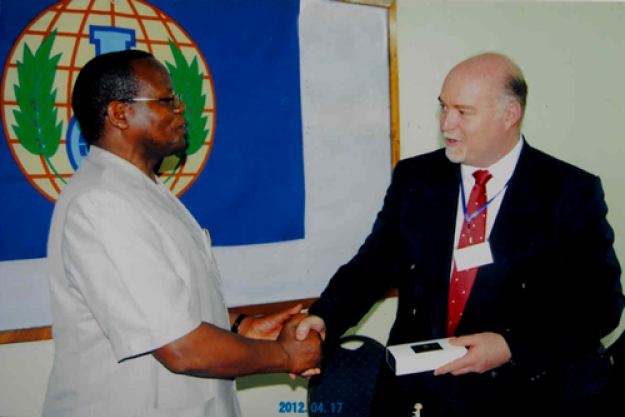
Mr. Mark Bor, Kenya's Permanent Secretary at the Ministry of Public Health and Sanitation, welcomes Mark Albon, OPCW's Head of Implementation Support.
The course was jointly organised by the OPCW and National Authority of Kenya from 17 to 20 April 2012 in Mombasa, and attended by 36 participants from 19 States Parties in East and Southern Africa.* It was the fourth course of its kind for customs officials in these two sub-regions and held under the OPCW’s Programme to Strengthen Cooperation with Africa.
Mr. Mark Bor, Permanent Secretary at the Ministry of Public Health and Sanitation, opened the proceedings on behalf of his Minister. Mr Bor encouraged participants to take full advantage of the course, which he said plays a critical role in eliminating the risk that States Parties’ territories may be used as conduits for proliferating chemical weapons and other related materials.
The agenda [PDF – 19 KB] offered an overview of the Chemical Weapons Convention (CWC) and the OPCW, the rights and obligations of States Parties, the role of National Authorities, and the need for effective stakeholder engagement. It also covered the transfer-related provisions of the CWC and identification of chemicals relevant to the Convention, including recommendations of the World Customs Organization to identify Scheduled chemicals in the Harmonised System.
Participants were familiarised with relevant information sources such as the Handbook on Chemicals, Online Scheduled Chemicals database, the OPCW Central Analytical Database and other useful databases and websites. They discussed discrepancies in the reporting of transfers of Scheduled chemicals and practical customs-related matters such as the control of Scheduled chemicals in ports and free zones, risk assessment, trans-shipments, and software for customs services. They also learned practical ways to implement the Convention’s provisions, and to eliminate discrepancies between quantities of Scheduled chemicals declared by importing and exporting States Parties in respect of the same transfers.
* Botswana, Burundi, Comoros, Ethiopia, Kenya, Lesotho, Madagascar, Malawi, Mauritius, Mozambique, Namibia, Rwanda, South Africa, Sudan, Swaziland, Tanzania, Uganda, Zambia and Zimbabwe.
